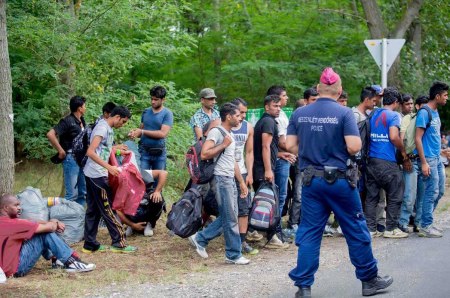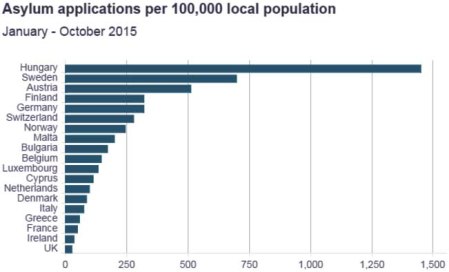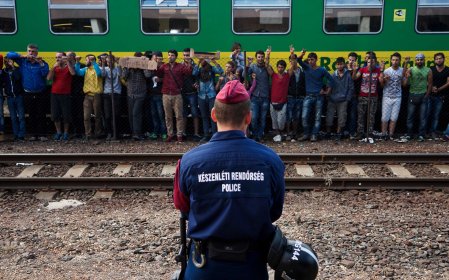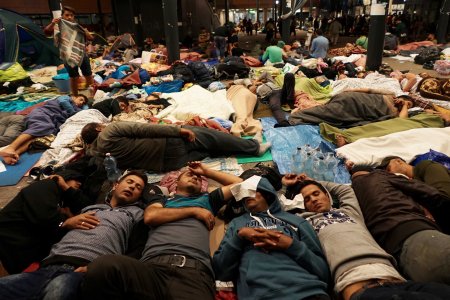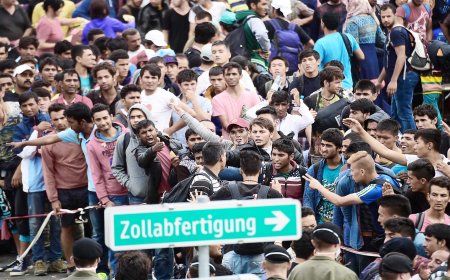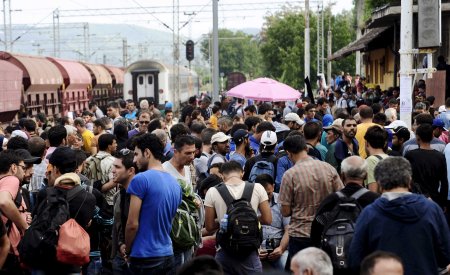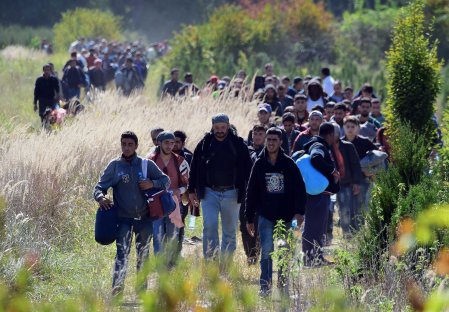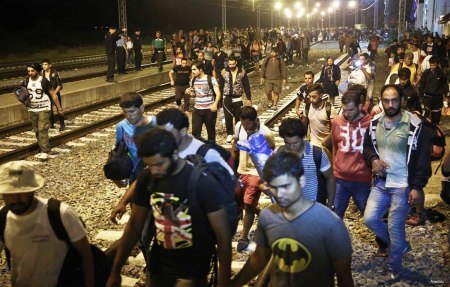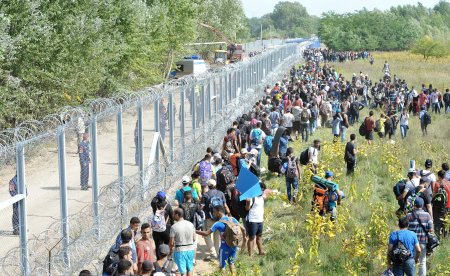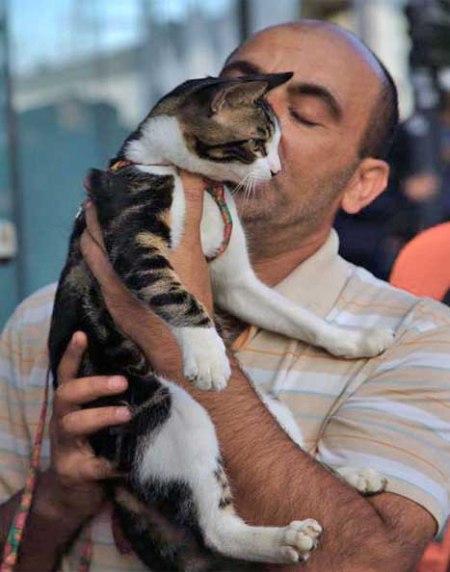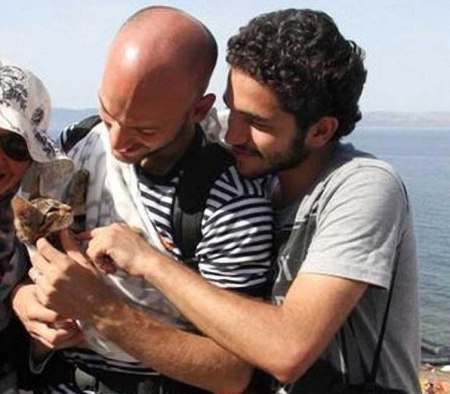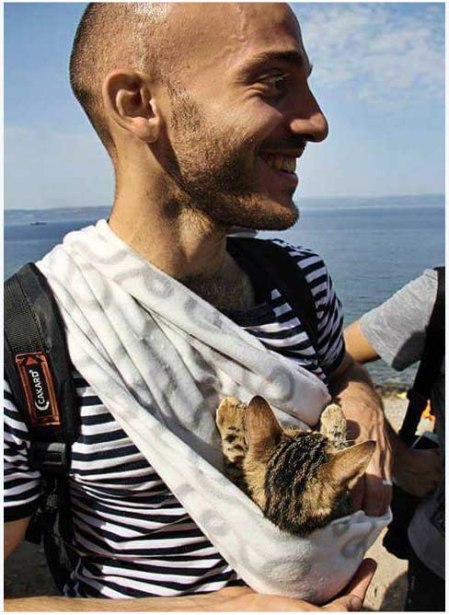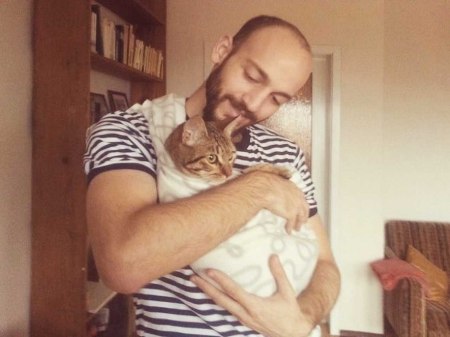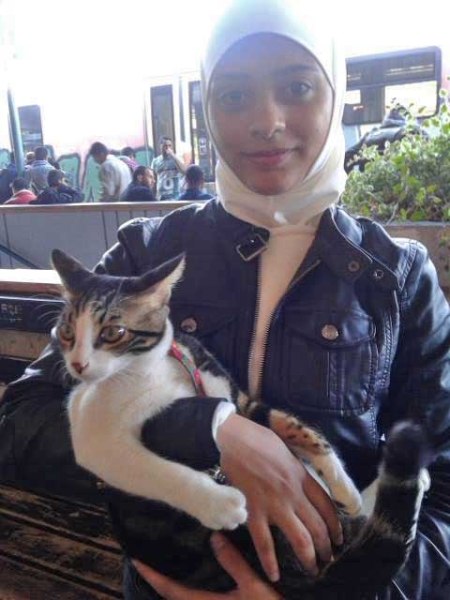1.2 million migrants have flooded Europe last year, and the enlightened and compassionate part of Europe’s population and political class have welcomed them and accommodated them as good as possible.
The welcoming Europeans and political leaders, spearheaded by German canceler Angela Merkel, were apparently the majority. Prosperous countries like Germany, Sweden, Norway, Austria were willing to accept asylum seekers, they were understandably also desired destinations of the migrants.
Transit countries in the Balkans and Eastern Europe were not as welcoming, but by and large supportive in channelling the flow of people from their southern or eastern to their northern or western borders. As the tidal wave of migrants swelled to biblical proportions, reaching thousands of people per day, Hungary installed a 4 meter high border fence and Macedonia, Slovenia, Slovakia, Croatia, Austria also build barriers at main crossing points.
Scuffles on the borders became frequent and police used teargas and water cannons to push back migrants who tried to cross the fences or tear them down. In one incident the rejected migrants blocked the way of others who had been allowed to pass, chanting: “If we don’t cross, no one does!”
First doubts arise
In August at least 17 people were injured, when in an overcrowded refugee shelter in Suhl, Germany, an Afghan man tore pages out of a Quran and threw the discarded pages into the toilet. Around 20 refugees chased the man and when the shelter’s guards protected him more than 50 men armed themselves with steel rods and began hitting and throwing rocks at guards and policemen. The mob ransacked the shelter and offices, smashed car windows, and damaged adjacent buildings in a rampage which lasted several hours.
The disused Tempelhof airport in Berlin, home to 830 refugees, descended into chaos when hundreds of refugees were involved in a mass brawl as lunch was being served. More than 100 police officers had to restore order. Soon after that police was called to another shelter in Berlin, where similar violence forced 500 inhabitants to flee the building.
When a mass riot broke out over food at a tented refugee camp near Kassel, Germany, Police had to use tear gas to break up fighting between Albanians and Pakistanis. Around 400 refugees were involved and 60 were hurt and needed medical care.
In Leipzig about 200 refugees, wielding table legs and bed frames, started a fight after they couldn’t agree who got to use one of the few toilets first. It took a large police contingent to calm the situation.
Riots and brawls were also reported from Hamburg, Friedland, Dresden, and several other places. There are several buildings who became uninhabitable after riots and who have to be completely (and costly) renovated.
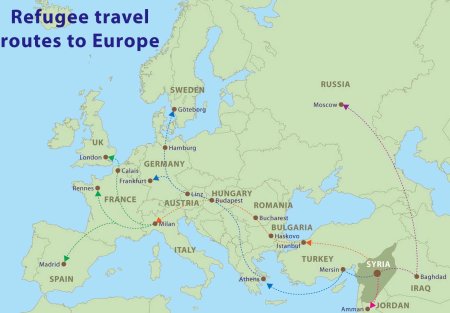 Already in October the German police union and women’s rights groups accused the authorities of playing down reports of sexual assault and even rape at refugee shelters to avoid criticism against asylum policies.
Already in October the German police union and women’s rights groups accused the authorities of playing down reports of sexual assault and even rape at refugee shelters to avoid criticism against asylum policies.
Interior Minister Thomas de Maiziere tried to play down the problem and told a news conference: “There are an unbelievable number of rumors regarding this issue, which are being spread massively over social networks.”
He was contradicted by charity groups, who sent an open letter to state authorities about alleged crimes. “There are several cases of rape and sexual assault and increasingly even reports about forced prostitution,” the joint letter said, adding that these were not isolated incidents.
Crowd of migrants were attacking women in central Cologne on New Year’s Eve near the city’s iconic cathedral, and women were robbed, threatened, sexually molested, and in two cases raped. About 1,000 drunk and aggressive young male migrants were involved, 581 people have filed criminal complaints, 305 of the complaints were about sexual attacks. There are a good number of videos documenting the violence.
Though initially the authorities and press wanted to conceal the incidents, word spread quickly on social media (supported by the videos) and the affair became a major embarrassment for the involved German officials. City police chief Wolfgang Albers was quickly retired.
Until now only 19 suspects have been apprehended, including 14 men from Morocco and Algeria.
Similar scenes during New Year’s celebrations were reported in Hamburg, Salzburg, Zurich, Helsinki.
A German policeman, speaking on condition of anonymity, said that Cologne-style attacks on women are common and routinely hushed up by the authorities.
Reports of assaults in public swimming pools have emerged from multiple German cities, including Munich. The city of Bornheim has banned male asylum seekers older than 18 from using the city’s swimming pool.
Authorities in Sweden are investigating claims that the police covered up sexual assaults committed by immigrant youths at the Stockholm “We Are Sthlm” music festivals in 2014 and 2015. Police allegedly documented 38 claims of sexual assault, including two alleged rapes, carried out by about 50 people, most of them young Afghans.
“It was a modus operandi that we had never seen before: large groups of young men who surround girls and molest them,” Roger Ticoalu from the Stockholm city administration said. “In the cases where we were able to apprehend suspects, they were with a foreign background, newly arrived refugees aged 17-20, who had come to Sweden without their families.”
Varg Gyllander, head of communications for Stockholm police, admitted that the controversy over welcoming refugees and immigrants may have played a role in the reluctance to publicize the attacks.
The political point of view
There are more than two million Syrian refugees in Turkish camps. Turkey has accommodated the refugees not for charity, but to have a bargaining chip in the effort to destroy the Syrian government under President Bashar al-Assad and replace it with an Islamic regime allied with Turkey.
The refugee camps were from the onset recruitment centers and training camps for IS (Islamic State), Jabhat al-Nusra, Ahrar al-Sham, and other Islamic rebel groups. Activities of these groups were halfheartedly concealed (to give plausible deniability) or particular areas of the camps and sometimes whole camps were cordoned off by the MIT (Turkey’s spy agency). Journalists and UN-officials without CIA credentials were not welcome.
When Russia entered the Syrian war and the Islamic terror groups came under increased pressure, Turkeys President Recep Tayyip Erdogan decided to play the refugee card to pressure Western allies for a forceful military action against Syria plus Russia and to quell criticism against Turkish authoritarian policies.
At the moment Turkey’s Islamist leadership is fighting on several fronts, conducting a bloody assault on Kurdish towns in the southeast (Nusaybin, Dargecit, Cizre, Silopi), dissolving the Kurdish party DTP, arresting journalists and academics who criticize the ruling AKP.
Turkey needs a free hand to eliminate internal dissent, kill off the Kurds, keep the supply corridors to Syrian terror groups open, and reorganize the illegal oil trade with Islamic State.
So: Refugees were bussed to the Mediterranean coast, Social media campaigns were launched (Twitter, Facebook), praising the migration via the Aegean sea as the best opportunity to escape the harsh camp life, retailers on the coast stocked up on inflatable boats and life vests, authorities issued thousands of Turkish passports and other identity documents to refugees.
The plan worked even better than expected because people from Kosovo, Afghanistan, Iraq, Pakistan, Eritrea, and other troubled countries joined the ensuing stampede and tried to slip into Europe as long as the doors remained open. The main destinations were Germany, Sweden, Hungary, Austria. German Chancellor Angela Merkel had for probably personal sentimental reasons encouraged the migrants and assured them that Germany will find a place for all.
When the migrant flood topped one million and overwhelmed state institutions, the EU (European Union) promised Erdogan three billion Euro, the easing of visa requirements, and renewed association negotiations, if Turkey would prevent refugees from embarking on the journey to Europe. In addition, EU politicians have since refrained from criticism against Erdogan’s authoritarian tendencies, the slaughtering of the Kurds, and the support of terrorist organizations.
Turkey until now has taken no concrete actions to stem the flow of refugees and the EU has not paid any money, but the European governments will have to cooperate more closely with Erdogan in the future, closing eyes or looking the other way when it comes to critical questions about human rights, democracy, rule of law, and measures against terrorism.
A suicide bombing in Istanbul on January 12, which killed 10 German tourists, is seen by many as an additional warning shot to make Europeans aware what Erdogan could unleash if his demands are not met. After all, no one has a better handle on IS than MIT head Hakan Fidan.
EU officials warn, that the current flow of migrants to Europe, estimated 2,000 to 3,000 arriving every day, is unsustainable.
Hungary’s prime minister Viktor Orban insists, that the flow of refugees and migrants pouring into Europe must be halted altogether, not just reduced, and calls for new border fences to be built in northern Greece. The Hungarian position and measures to cut the migrant flow by building a border fence was criticized by many as insensitive, but it is understandable, considering that Hungary has taken more refugees per capita than any other European country.
More than 1,450 refugees per 100,000 of Hungary’s local population claimed asylum in the first half of 2015. The corresponding figure for Germany was 323 and for Britain 30.
A tightening of border controls along the transit route to the promised lands of Germany and Sweden has left thousands trapped and destitute in financially wrecked Greece, the place most migrants definitely don’t want to be.
Sweden, a favored destination for many of the migrants, tries to stem the flow by imposing controls on travelers from Denmark. Germany now sends 200 migrants daily back to Austria, it has to be seen yet what Austria will do with them.
Even German Chancellor Angela Merkel says now, that the rules will be adjusted to make it easier to deny asylum to criminals. German authorities will change the guidelines for deporting migrants who commit offenses like bodily harm, sexual assault, robbery, and serial shoplifting. Sentences of one year and more will be sufficient reason for deportation.
The problem of this approach is, that many migrants have invalid, forged, or no personal documents, and their home country will not take them back. This happened already in December with a group of 31 Pakistanis, which Greece wanted to deport and which Pakistani authorities sent right back with the same plane because they did not have identity card numbers.
Gerd Muller, Germany’s economics minister, outlined a new “Marshall Plan,” costing 10 billion Euro, that envisages the creation of an “all-European reconstruction fund” to finance the rebuilding of settlements in war-torn Syria and Iraq.
An agreement by EU countries in September to spread the resettlement of 160,000 refugees is in disarray. As of January 12, just 214 persons have been relocated.
The ecological point of view
The already mentioned Gerd Muller, Germany’s economics minister, warned:
“The biggest refugee inflow is still ahead: African population will double in the next decades with the population of Egypt reaching 100 million and Nigeria’s population reaching 400 million.”
The minister also insisted that the process of refugee inflow is largely irreversible as “in our digital era, with internet and mobile phones, everyone is well aware about our [European] wealth and lifestyle,”
“We cannot just build fences around Germany and Europe. When people suffer, they will come,” Muller said, adding that “it does not matter what we decide here. These people will not ask us if they may come.”
He is right and Europe is not the only part of the world facing a migrant crisis. The USA has a longstanding issue with Latin American migrants who cross the Mexican border illegally to find work, taking low paid and often dangerous jobs in agriculture, construction, mining. Such jobs would not be accepted anyway by white US-citicens, and yet, vigilante groups are patrolling the southern border and GOP politician call for tough action against the illegal aliens.
Mexicans make up about half of all unauthorized immigrants, and most are economic migrants, but there are also people from Guatemala and Honduras who are fleeing persecution.
In 2014 there were 11.3 million unauthorized immigrants in the USA , which amounts to 3.5 percent of the total population.
Many countries in Africa and the Middle East are experiencing drought, desertification, water scarcity, and rising temperatures. If global greenhouse gas emissions continue to rise, the outlook for at least half the inhabited planet looks arid. By 2100, according to new research, at least half of the land surface of the planet will be classified as dryland.
This will be a global catastrophe and one has only to look at todays emergencies to understand what is coming.
14 million Ethiopians are in critical need of food aid and 2.1 million are considered acutely malnourished. Around 3 million people in South Sudan are facing a hunger crisis.
The Red Cross Red Crescent Climate Centre predicts a high likelihood of floods in equatorial Africa and increased risk of drought in parts of southern Africa and the Sahel region.
A series of climatic shocks in 2014 and 2015 has decimated harvests and left many people in Gambia, Mauritania, Namibia, and Senegal dependent on food aid to survive. Floods and drought have dramatically reduced maize production, the regional staple.
In southern Africa, Zimbabwe, Malawi, and South Africa have been hit by drought.
South Africa is in the midst of its worst drought since 1982, with 2.7 million households facing water shortages. The lack of rain has been accompanied by soaring temperatures up to 40 degrees Celsius. Many farmers, especially black owners of small farms, have lost their livelihood.
In Malawi almost half the children are already undernourished. In Zimbabwe, the number of people in need of food aid is expected to reach 1.5 million.
In Madagascar a persistent drought ravaged last season’s crops. WFP (World Food Program) rations currently are keeping some 120,000 people alive, 350,000 people are suffering from hunger. Children are malnourished, stunted, they will never grow up to their full genetic potential. They will be weak and ailing for their whole life, which may be rather short. Many will be disabled.
16 million Yemenis, almost two-thirds of the population, are without drinking water, the capital Sana’a might run out of water as soon as 2017.
Saudi Arabia has stopped all agricultural projects (mostly wheat) because the aquifers are depleted and irrigation is not possible anymore.
A scientific study published in the Nature Climate Change journal states, that rising temperatures from climate change within this century are likely to make the Persian Gulf region — including Islam’s holy city of Mecca — uninhabitable by humans.
The authors warn that cities such as Doha in Qatar, Abu Dhabi and Dubai in the United Arab Emirates, and Bandar Abbas in Iran, could well surpass the 36 degrees Celsius threshold for human survival.
There is a persistent drought and the deserts are expanding in Iran, Iraq, and Syria. Even if war ends, these countries will not be able to produce enough food for the population and will be reliant on imports.
All mentioned water and food shortages are exacerbated by overpopulation. Humans have cut down trees for firewood and herds were grazing pastures for thousand of years without overly detrimental effects on nature, but in recent years human numbers have increased dramatically.
The pastoralists drive their cattle around as they did for generations, but when they leave a meadow the next herd arrives and plants have no chance to regenerate, to grow and bloom and spread their seeds. Subsequently the place becomes overgrazed, becomes a wasteland. Water and wind then remove the unprotected top layer (soil erosion) and what remains is desert, where nothing will ever grow again.
In Somalia the last forests are clearcut because criminal gangs and terror groups like al-Shabab make charcoal out of the wood which is sold and used for cooking. Charcoal made from Somali acacia trees is particularly prized in the Gulf states, because it burns longer than alternatives from Sudan or Nigeria. The UN banned exports of Somali charcoal, yet, revenues earned by al-Shabab have even increased since the ban. None of the Gulf states seems to be concerned about buying from al-Shabab.
The dramatic population increase in Africa and the Middle East is caused by poverty, illiteracy, and patriarchal societies where girls are married off as soon as they reach their reproductive age and successively give birth to a child every year. Contraception is not used because of religious and shortsighted political reasons.
It is hard to imagine that women in these regions love to have so many children. Common sense and logical thinking imply that no woman willingly will take the burden and the risk to give birth and raise five, six, or more children in a war torn country where even the most basic support systems can’t be taken for granted. But the women have no say in this matter, they are regarded a property of their husband who can use them as he likes and also easily discard them by just saying three times: “I divorce you.”
All this applies to the refugees who are descending on Europe. 15 percent of Syrian women in Turkeys refugee camps are pregnant.
One has to ask if the nations, which keep their populations at ecologically acceptable levels, avoiding thereby habitat destruction and the breakdown of the ecosphere, should invite migrants from overpopulated areas which were devastated because of high birth rates.
These migrants will import their culture of high birthrates and replicate what has happened in their country of origin, destroying the environment of the new host as well.
Thoughts like this will of course instantly be dammed as fascist, as Nazi-inspired eugenics, as New World Order population control, because males from all political direction and denominations are steadfastly insisting on their sacred right to father as many children as possible.
The social point of view
Societies with skewed sex ratios tend to be unstable, because if men are the overwhelming majority they will start to fight for the few available women. Sex, after all, is a main driver of human behavior, second only to the need of acquiring food.
Between 70 and 80 percent of the migrants, which are streaming into Europe, are men in their twenties. In Sweden, for instance, which like Germany until recently has had an open door, 71 percent of all asylum applicants in 2015 were men. Among the mostly-late-teenage category of “unaccompanied minors,” the ratios were even more skewed: 11.3 boys for every one girl.
Many of these men carry suppositions about women’s roles in society that are diametrically opposed to the values of contemporary Europe. This will not be changed by quick courses or handouts like the Norwegian curriculum for migrants which states: In Europe “to force someone into sex is not permitted.”
For many years European industrialists have welcomed migration because increased competition for jobs did put a pressure on labor unions and lowered wages. It was argued that reduced birthrates and resulting demographic imbalances (meaning too many old people) would strain social security and the migrants were needed to fill job vacancies and pay for pensions.
But most migrants who arrive now in Europe have not the necessary skills to fill job openings. The education system in Islamic nations is lacking and has broken down in conflict zones like Syria, Libya, Iraq, Yemen, Palestine, Somalia. There is a whole generation which doesn’t receive any formal education.
Unemployment of low skilled workers in European countries is already 20 percent and more, there are no additional unskilled workers needed. The migrants will have to undergo vocational training, which can take a few years and will be exhausting. Apprenticeships are poorly paid and businesses big or small will rather take native adolescents who are expected to better fit into the workforce.
“There can be no truce between science and religion.”
John B. S. Haldane
John B. S. Haldane
In the legendary “Golden Age” of Arabic science, spanning the eighth through the thirteenth century, Muslim innovators developed the magnetic compass and tools of navigation, pens and printing. Muslims invented algebra (the use of mathematical symbols). Islam was in the forefront of human civilization and achievement. But this is history.
Today education in the madrassas is centered around the Quran and fiqh (Islamic jurisprudence), the pupils have to memorize Quranic verses instead of algebraic and functions formulas.
Muslim countries have 9 scientists, engineers, and technicians per thousand people, compared with a world average of 41. In these nations, there are approximately 1,800 universities, but only 312 of those universities have scholars who have published journal articles. Of the fifty most-published of these universities, twenty-six are in Turkey and nine are in Iran.
There are not many Islamic universities whose graduates join research teams around the world or work in laboratories on groundbreaking technologies to receive one day a Nobel Price.
In 1979 Pakistani Abdus Salam received the Nobel Price in Physics, in 1999 Ahmed Zewali the Nobel Price in Chemistry, 2015 Aziz Sancar the Nobel Price in Chemistry. As Muslims constitute 23 percent of the world’s population, this is not a great turnout.
Many of the Turkish and North African immigrants who arrived in Germany and France decades ago are reasonably integrated today. The Muslim refugees from the Balkan wars are also mostly absorbed. But there are ghettos in France, Belgium, the Netherlands, Britain, Sweden, where migrants keep to themselves with little contact to the rest of society. They avoid being assimilated because they despise the culture of their host country.
Some of these ghettos are “no-go zones,” which non-Muslims and even police cannot enter. Some are hotspots and recruiting areas of terrorism.
The Swedish police officer Jacob Ekstrom was quoted in a report by a scientific journal about the infamous enclaves Tensta and Rinkeby. “If we’re in pursuit of a vehicle, it can evade us by driving to certain neighborhoods where a lone patrol car simply cannot follow, because we’ll get pelted by rocks and even face riots. These are No-Go Zones. We simply can’t go there.”
Until the catastrophe of World War II and the Holocaust, Jewish communities in Germany, Poland, Austria lived partly in distinct quarters of cities and in ghettos, some of which were surrounded by walls to protect the community against harassment and pogroms. The Jewish ghettos were often places of dire poverty, with narrow streets and small, crowded houses. The residents had their own justice system. Jews also lived in small towns, called Shtetls.
The Jewish communities were not dependent on charity, they did not receive welfare handouts. They had to acquire skills and offer them to the outside world. They were tailors, shoemakers, merchants, craftsmen of all kind.
The Shtetls were places of vibrant cultural life and they contributed greatly to the richness and diversity of European culture. It is a tragedy that the Nazis destroyed the Jewish communities and with them a part of world heritage.
Something similar is happening right now, as the Islamic State monsters try to wipe out the Assyrians and Yazidis and are smashing monuments in Nineveh and Palmyra. Did Caliph Ibrahim (Abu Bakr al-Baghdadi) take his cues from Hitler’s Mein Kampf?
Germany, with a population of 82 million, should be able to absorb one or two million migrants despite significant cultural and social incompatibilities. But there are only 10 million Germans in their twenties, and this is exactly the age group where most of the migrants belong.
Two or more million young refugees facing just 10 million Germans of the same age will have indeed a transformative effect, will radically change the social fabric and the culture. Such a transformation promises increased polarization among natives and new arrivals alike. It threatens not just a spike in terrorism but a rebirth of 1930s-style political violence.
An increased popularity of anti-immigration parties, far-right demos of PEGIDA, the torching of refugee centers, street battles and attacks from both sides are indications how Europe’s future will look like if governments don’t take appropriate measures.
When in 2007 the Eastern European countries Bulgaria and Romania were incorporated into the EU to further hurt and isolate Russia, there were, just as now, fears that an invasion of migrants from these two countries would overwhelm Western societies.
The fears were unfounded, but what happened was, that all the thugs, petty criminals, and tricksters from these two countries moved west, because in their impoverished homelands not much booty was to be made anymore and they assumed, that the gullible Western Europeans would be an easy pray. Romanian gangs are now operating in many European cities and contribute to rising criminality, especially theft and robbery.
Something similar is most likely happening now with the Middle Eastern migrants. All kind of unsavory characters are mingling into the migrant stream, hoping to trick, fraud, rob the artless Europeans. In their homeland everything what can be looted is already gone and sold, it is only logical, that they try to explore and exploit new terrain.
The lack of interpreters and unfamiliarity with Islamic culture makes it difficult for the authorities to detect the goons and bums inside the crowd, Rising incidents of theft and robbery will lead to suspicions against all migrant which in turn will further increase their feeling of alienation.
Is there any practical solution?
Local authorities are stretched both financially and logistically to house and look after refugees and there has been a backlash by right-wing groups who warn about the problems of integration.
When the influx of migrants overwhelms the authorities, when a breakdown of law and order is looming, when the social structures are in danger, the borders have to be closed.
Countries need to launch wide ranging programs to train interpreters, social workers, psychologists, the municipalities need to build new refugee centers and camps, as preparations to accommodate, educate, integrate, employ more migrants. It is a shame that this preparations have not been made in anticipation of this crisis.
Foresight was never a strong talent of European leaders.
Migrants should only be accepted on condition of strict gender parity. For every male refugee there has to be a female refugee. This is not a radical and new proposal, Canada for instance won’t allow single Syrian male refugees inside its borders.
All residency permits should be conditional. If a migrant after three years is not able to find work and live independently without welfare, he or she has to leave.
The psychological point of view
Most of the genuine refugees from war zones are traumatized, are haunted by the memories of terror, explosions, collapsing buildings, the smell of burning flesh, blood spattered and body parts laying around. They have seen relatives and friends die in crossfire or in bombing raids. These people may have nightmares, sudden mood flashes, difficulties to focus. They may be aggressive, in constant distress, and prone to addictions.
Such refugees would need counseling and long time psychotherapy, they would need an assuring social environment, a family, a circle of friends who care for them. They would need to know that one day they can lead a purposeful life and be accepted as equal members of society.
All this is out of reach. They mostly have only their peers who are equally traumatized. They realize that they are regarded as aliens, outsiders, viewed with suspicion. There are also not hundred thousands of psychiatrists, psychologists, or other mental health providers available and there are nearly none who can speak Arabic.
It needs generations to overcome the ghosts of war and some societies never heal again. Societies may recover when a strong social fabric and deep cultural traditions provide the framework along which the healing process can progress (as it happened in Japan, Germany, Russia, China).
The war refugees don’t have this social network and assuring cultural traditions, they are expected to give up their culture and social norms and replace them with the culture and the norms of their host country.
Sometimes it will work nevertheless, because the human mind is astonishing flexible. We can forgive and forget, we can reconcile with the strange turns and the inevitabilities of life, we can compromise, overcome our prejudices, aversions, blockades, phobias.
But what shall be done with the ones who’s mental wounds don’t heal? Lock them up in internment camps (which will inevitably be viewed as concentration camps)? Deport them to a lonely island? Send them back into war?
All this applies equally to economic migrants who have experienced grinding poverty, natural disasters, epidemic diseases, and the violence of a disintegrating society. If they would not have been under duress, if they would not have experienced hardship and deprivation, they would not have fled but rather enjoyed life in their home country.
The cultural point of view
All cultures have an inherent impulse to preserve themselves, because without this impulse they would disappear, being assimilated or destroyed by other cultures. So the fears to loose the cultural heritage, to be Islamized, to become “Eurabia,” is an instinctive reaction, is understandable.
Europe experienced already one debilitating cultural onslaught when after World War II Anglo-American media and music companies used the cultural vacuum created by Hitler and steamrolled native musical traditions.
The great personalities of German popular music, Kurt Weill, Friedrich Hollaender, Erich Korngold, had emigrated to the USA, prominent classical composers like Arnold Schoenberg, Ernst Krenek, and Paul Hindemith also had been driven out.
The music culture in German speaking countries never recovered from this blow, though the traditional folk music from the Alpine regions is still alive and has secured its niche.
From this historical point of view it is understandable if Europeans now say: “Please, not again!”
I personally, being a child of migrants myself, never cared much about European cultural traditions and fully embraced multiculturalism. Though my favorite composer is J.S. Bach, I like Mali Djembe rhythms and South African choirs. Nkosi Sikelel (the South African National Anthem) still brings tears to my eyes.
I was fascinated by Afro American music (Blues, Jazz, Gospel, Soul, R&B) and by Latin Music (Salsa, Samba, Bossa Nova, Tango). Astor Piazzola, Abdullah Ibrahim, Hiromi Uehara, Sarah Vaughan, Roberta Flack, Donny Hathaway, Al Green, Curtis Mayfield, these are musicians which I admire.
I listened to oud players and composers Munir Bashir, Mohamed El-Qasabgi, Sherine Tohamy, Farid Al Atrash, and though their music is not as sophisticated structured as European classical music, Indian Raga, or some Jazz genres (Big Band, Smooth, Contemporary, Fusion), it is refreshing different and one could get used to it.
I’m enchanted by Arabic calligraphy, painting, architecture. Arabic art has a place in world culture and it is developing, demonstrated by graffiti and murals of Egypt’s revolution in January 2011.
There are though aspects of Arabic and Islamic culture beyond art, which are not compatible with humanitarian ideals and values, the most important one being the subordination of and discrimination against woman.
This is not necessarily a religious matter, because there are Muslim men who treat women with respect and regard them as equals. Religion though is used as justification for cultural practices which evolved long ago in patriarchal tribal societies.
In the UK, immigrants from Pakistan have set up an estimated number of 86 sharia courts, sometimes referred to as sharia councils. In 2013 a BBC investigative report documented, that sharia courts, which operate in mosques and cultural centers across Britain, routinely issue rulings on domestic and marital matters that are at odds with British law.
Although sharia rulings are not legally binding, those subject to the rulings usually feel obliged to obey them as a matter of religious belief, or because of pressure from family and community members.
Baroness Cox, a cross-bench member of the British House of Lords, has warned, that Britain risks having an alternative legal system which discriminates against women and has introduced a bill which will make it illegal for sharia courts to act as legal courts. The Arbitration and Mediation Services (Equality) Bill passed its second reading in the House of Lords in October.
The bill addresses the precarious position of women in unrecognized Islamic marriages by requiring public bodies to inform individuals of the need to “obtain an officially recognized marriage in order to have legal protection,” and to notify people “that a polygamous household may be without legal protection and a polygamous household may be unlawful.”
The bill tries to help vulnerable women who need protection from exploitation and it addresses the problem of religiously sanctioned gender discrimination. It also addresses the problem of an alternative Islamic quasi-legal system that undermines the fundamental principle of one law for all.
The disapproval of sharia law results from the reality that it condones domestic violence and physical abuse against women, and that it undermines equal rights and protection under British law. In sharia law, the process of halala allows a man to divorce his wife by uttering the words “I divorce you,” three times. Divorce can be issued by mail, polygamy to the extent of four wives is allowed. Women are handicapped on issues of child custody, inheritance provisions, and rules of evidence in trials, as women’s testimony accounts for only half that of men. Male heirs in an inheritance dispute receive twice the amount of women involved.
Official authorities may be unwilling to take action against gender discrimination and abuse of women in Islamic communities because of political correctness or fear of offending the minority. This was the case in what has been called the “Rotherham child abuse scandal.” In August 2014 an official report found, that in Rotherham, an industrial town in northern England, gangs of local men, almost all of whom were alleged to be Pakistanis, raped, coerced by drugs and alcohol, and sold more than 1,400 girls over the past 14 years.
To its shame the Labour Party local council not only failed to halt this abuse but sometimes denied what had happened and thereby perpetuated it. By their standard of institutionalized political correctness, to act against the alleged perpetrators would have been “racist.”
The religious point of view
Conservative and populist writers, public figures, and politicians speak of an “Islamic conquest” by migration and of the danger that Europe loses its Christian identity. The refugee stream is perceived as hijrah (jihad by migration), and if it is not stopped, Europe will become a Caliphate, ruled by Sharia law.
Many of these alarmists either deliberately or out of ignorance confuse cultural facets and peculiarities with religious ones. The holy scripts of Islam (Quran and Hadith) are, like all religious texts, interpreted differently depending on the particular social, economic, and cultural environment.
The Kurds in Rojava (northern Syria) for instance are mostly Muslims, and yet they govern their territories (the cantons Afrin, Kobane, Jazeera) according to a progressive model based on participatory democracy, gender equality, religious and ethnic pluralism, and decentralization (local autonomy).
I have personally met Muslims who were respectable and sincere people and at least two subscribers of this blog are Muslims.
And yet, Wahhabism, a branch of Sunni Islam which is aggressively promoted by Saudi Arabia, is characterized by the notions of Islamic superiority, misogyny, intolerance, and autocratic rule (by monarchs, also called sultans and emirs, or by a Caliph, if there is one).
Saudi Arabia has funded the building of thousands of mosques, madrassas, and Islamic cultural centers around the globe and taken care that the Imams, preachers, teachers there spread the pure and undiluted form of Wahhabism. Consequently Sunni Wahhabism has become the fastest growing religion on earth.
This is not only because of aggressive proselytizing but also because of extremely high birth rates in Sunni communities.
Freedom of belief in religions, ideologies, philosophies is a cardinal principle, and those who voluntarily practice particular faiths should be left alone as long as their beliefs don’t contradict universally accepted laws and social norms, and don’t harm their fellow humans.
Yet, European culture and social norms endorse by and large and at least in theory gender equality, cultural and religious tolerance, and democratic governance, principles, which totally contradict Wahhabism.
Social workers and volunteers note that ethnic, social, cultural, and religious tensions are on the rise in Germany’s overcrowded refugee shelters. Muslim Chechens for instance were beating up Syrian Christians in a Berlin shelter. In Hemer, Algerian asylum seekers attacked an Eritrean and his pregnant wife. Both wore their baptismal cross around their necks. One struck the Eritreans with a glass bottle.
A Christian family from Iraq, which was housed in a refugee camp in Freising, Bavaria told a TV crew of the Bayerischer Rundfunk of beatings and threats by Syrian Islamists. “They yelled at my wife and beat my child. They said that they will kill us and drink our blood.” The family lived in the camp like prisoners — until they no longer could stand it and returned to Iraq.
According to the Munich-based ZOCD (Central Council for Oriental Christians), insults, threats, discrimination, and blackmail against Christian asylum-seekers are a regular occurrence.
The German orthodox priest Hegumen Daniel (Irbits), rector of the St. George Monastery and member of the Integration Committee at the Federal Chancellery, wrote in a letter to Minister Peter Altmaier:
“Christian refugees from Syria, Eritrea and other countries are exposed to humiliation, manhunt and brutal harassment at the camps for refugees by Muslim neighbors. This also relates to the Yazidi religious minority. The cases when humiliation comes to injuries and threats of death are frequent,“
Maintaining, that the police rarely interferes in the settlement of religious conflicts, Father Daniel wrote further:
“We ask you to exert the necessary pressure to ensure the observation of the German legislation at the centers for asylum seekers and if it is impossible to fully implement this to accept the proposals by the clergy of different Christian confessions in Germany and ensure so that the Christians will be accommodated separately from the Muslims.”
Conclusion and Epiloq
I live in a small rural village 12 kilometers from the Austrian border town of Braunau, a place who came to world fame because it is the birthplace of Adolf Hitler. Braunau’s inhabitants are not happy about being associated with one of the greatest war criminals in human history and have put a memorial stone against war and fascism in front of the house where Hitler was born. The house itself is uninhabited since a few years, before that is was occupied by a charity organization who trains and employs disabled people.
When I drove down the town square of Braunau in early December, it was crowded with migrants, and on a nearby street a column of busses was parked, who had apparently brought them right from the Hungarian or Slovenian border.
As I drove along the crowd I noticed, that the migrants were mostly young men. “Where are the women, children, the elderly?” I thought. I also noticed that the usually clean and tidy square was littered with empty plastic bottles, plastic bags, and wrapping paper. “The locals will not like this,” I thought, “this will make bad blood.”
The town square merges into a roundabout from where one can drive over a bridge across the river Inn to Braunau’s sister town Simbach on the German side of the border. I could not cross the bridge because it was completely blocked by migrants.
As I was circling the roundabout I just got a glimpse of the other side of the bridge where a sizable contingent of German police were standing, busy with questioning and registering people as the column moved slowly forward. I’ve never before seen so many police officers in one place.
I drove to another nearby bridge which is mostly used by trucks and cargo vans. No migrants there but lot of police, some of them from a special unit with black uniforms, balaclavas, and assault rifles. “They take no chances,” I thought. The police officers waved me by politely. Most often they smile but this time they looked a bit tense. “No wonder,” I thought. ”All the time working overtime, staying put in the cold — and that before Christmas.”
I talked with friends about the refugee crisis, all of them progressive, open minded, liberal, left leaning. “Well, we have to help them, it is our humanitarian responsibility,” was the first response. Then: “But someone has to pay for it, and that will be us.” In the end, all admitted, that they are fearful, that they would rather have the migrants far away, that they would prefer to have the borders closed.
People from Braunau told me that they are afraid and avoid to go out, that they call their friends to organize joint shopping trips. Others hinted that they may vote for the xenophobic Freedom Party, which they normally would regard as despicable and beyond the pale.
It will be a rude awakening for the governing parties in Europe. Does German Chancellor Angela Merkel sense, what is coming?
Friends from Salzburg told me that the platforms of the railway station are crowded with foreigners and that full bearded Islamists are selling German language versions of the Quran. I don’t appreciate Jehova’s Whitnesses standing on the corner and selling the Watchtower, I don’t appreciate Islamists offering the Quran either.
A friend who teaches at a nearby secondary school took voluntarily integration classes. Initially optimistic and confident, after half a year she gave up and luckily could manage it to get rid of the assignment.
She told me that there is no chance to bring the immigrant children to the same level as their classmates, and she voiced the opinion, that it is not only a matter of the language barrier but also a seemingly very different parenting which doesn’t prepare the kids for the European education system.
When the children realize that they cannot keep up with their peers, the girls become passive and withdrawn, while boys become aggressive and rambunctious. These children all will end in special needs courses, none of them will complete even the secondary education. Will they become the next generation of terrorists?
I have to be cautious and self-critical, because I’m not free from noxious and detrimental affections of arrogance, exceptionalism, xenophobia, islamophobia. The dislike of or prejudice against Islam or Muslims is immoral and harmful, especially if the attitude transcends into a political force. While I was writing this text I often hesitated to type what I was thinking. A thousand times I asked myself: “Is this correct, is this just, is this necessary?”
I have not made up my mind and probably never will, the only thing that I know for sure is, that we have to prepare for fundamental changes. We have to strive for local autonomy, for self reliance and independence.
The 1.2 million migrants in 2015 are just the vanguard, are just a trickle compared to the hundreds of millions who will follow. The state systems will be under strain, will eventually break down — anarchy and chaos may ensue.
We have to strengthen and benefit society around us. We have to learn living better and happier with less. Our example may not sway the evil forces of destruction but it is still the best thing we can do.
We knew that before.
